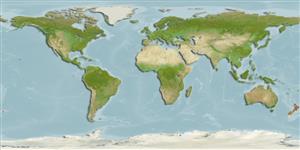Teleostei (teleosts) >
Blenniiformes (Blennies) >
Tripterygiidae (Triplefin blennies) > Tripterygiinae
Etymology: Cryptichthys: Greek, kryptos = hidden + Greek, ichthys = fish (Ref. 45335); jojettae: Named after Jojette Drost, former staff member of the National Museum (New Zealand), collector of the paratypes of this species.
Eponymy: Johanna Henriette ‘Jojette’ Drost (d: 1960) is a New Zealand biologist who currently a horticulture technician. [...] (Ref. 128868), visit book page.
Environment: milieu / climate zone / depth range / distribution range
Ecology
Marine; demersal; depth range 0 - 12 m (Ref. 13227). Temperate
Southwest Pacific: endemic to New Zealand.
Size / Weight / Age
Maturity: Lm ? range ? - ? cm
Max length : 6.0 cm TL male/unsexed; (Ref. 9003)
Short description
Identification keys | Morphology | Morphometrics
Dorsal spines (total): 18 - 21; Dorsal soft rays (total): 9 - 11; Anal spines: 0; Anal soft rays: 20 - 22. Head and body red to reddish brown with pinkish blotches and prominent dark columns and arches running onto belly. Fins of various hues of pink and red. Distinguished from other triplefins by the distinctive color pattern and the continuous lateral line extending to the caudal peduncle.
Adults inhabit rock pools and in surge zones, especially in exposed areas. Usually on steep slopes or sides of boulders encrusted with invertebrates and algae (Ref. 13227). Eggs are hemispherical and covered with numerous sticky threads that anchor them in the algae on the nesting sites (Ref. 240). Larvae are planktonic which occur primarily in shallow, nearshore waters (Ref. 94114).
Life cycle and mating behavior
Maturity | Reproduction | Spawning | Eggs | Fecundity | Larvae
Fricke, R., 1994. Tripterygiid fishes of Australia, New Zealand and the southwest Pacific Ocean (Teleostei). Theses Zool. 24:1-585. (Ref. 13227)
IUCN Red List Status (Ref. 130435: Version 2024-1)
Threat to humans
Harmless
Human uses
Fisheries: of no interest
Tools
Special reports
Download XML
Internet sources
Estimates based on models
Preferred temperature (Ref.
123201): 11.9 - 18.5, mean 15.9 °C (based on 131 cells).
Phylogenetic diversity index (Ref.
82804): PD
50 = 1.0000 [Uniqueness, from 0.5 = low to 2.0 = high].
Bayesian length-weight: a=0.00741 (0.00412 - 0.01333), b=3.06 (2.90 - 3.22), in cm total length, based on LWR estimates for this species & (Sub)family-body (Ref.
93245).
Trophic level (Ref.
69278): 3.2 ±0.4 se; based on size and trophs of closest relatives
Resilience (Ref.
120179): High, minimum population doubling time less than 15 months (Preliminary K or Fecundity.).
Fishing Vulnerability (Ref.
59153): Low vulnerability (10 of 100).
Nutrients (Ref.
124155): Calcium = 283 [143, 976] mg/100g; Iron = 1.08 [0.47, 2.38] mg/100g; Protein = 17.9 [16.4, 19.4] %; Omega3 = 0.409 [0.136, 1.260] g/100g; Selenium = 14 [4, 46] μg/100g; VitaminA = 9.64 [1.63, 56.15] μg/100g; Zinc = 1.7 [0.9, 3.0] mg/100g (wet weight);
